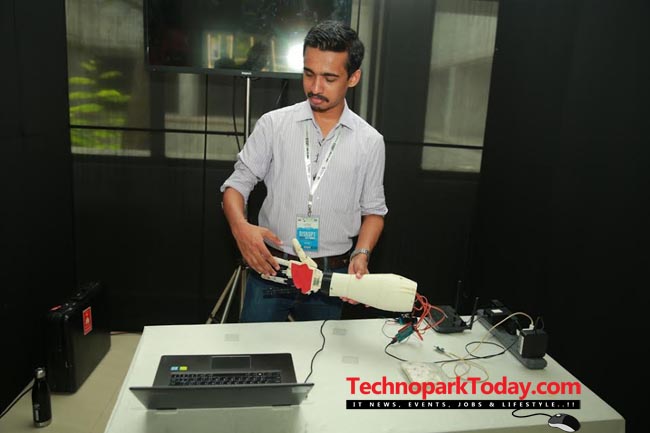 TechnoparkToday.com>> Sporting innovative, almost completely in-house designed architecture, a low-cost bionic hand that can help forearm amputees regain a measure of their prior grasping and holding capabilities received an enthusiastic response at a product demonstration here at Technopark.
TechnoparkToday.com>> Sporting innovative, almost completely in-house designed architecture, a low-cost bionic hand that can help forearm amputees regain a measure of their prior grasping and holding capabilities received an enthusiastic response at a product demonstration here at Technopark.
Not only is the prototype potentially much more customisable and user-friendly than products currently available in the market, the 3-D printed device is expected to eventually be priced at a fraction of its competitors’ costs.
“When it hits the market, our creation will probably fetch between Rs 1-1.25 lakh whereas existing bionic hands cost in excess of Rs 10 lakh. The reason we are able to pass on the savings to the customer is due to the cost-effective and custom-built tech that has gone into our hand,” said Sanju Mathew, CEO of Onbyz – the city-based startup that has developed the device.
 Mathew put the second generation prototype through its paces at a live demo conducted as part of the one-day ‘Disrupt Kerala 2017’ conference held across four venues in Technopark on Wednesday. The conference, marking the 50th edition of the FAYA:80 tech conclave series, was organised by the Kerala Startup Mission (KSUM) in association with NASSCOM and ICFOSS.
Mathew put the second generation prototype through its paces at a live demo conducted as part of the one-day ‘Disrupt Kerala 2017’ conference held across four venues in Technopark on Wednesday. The conference, marking the 50th edition of the FAYA:80 tech conclave series, was organised by the Kerala Startup Mission (KSUM) in association with NASSCOM and ICFOSS.
Onbyz’s bionic hand works through electrodes that transmit signal over wires from the intact nerves and muscles in the elbow to a microprocessor that directs the digits to move. This set-up allows the user to manipulate the hand to grip objects. While the movement isn’t real-time just yet, the lag between signal input and output is expected to decrease further along the development process.
First conceptualised in 2010 and with a third generation variant slated to be unveiled in 2018, the device features sophisticated new architecture that marries custom adaptable platform-based internal hardware to an operating system that facilitates the use of community-developed software.
“Unlike a closed operating system that offers limited options and levies further charges for selecting extra features, our device comes with a graphical interface that allows users to access a web-based marketplace from where they can pick and choose add-ons – like say making a thumbs-up or okay sign – to download and install on their hands to improve functionality for free,” Mathew said.
Another source of savings is Onbyz’s innovative slip sensor system – a Rs 400 bargain that utilises an array of six sensors to gauge the pressure required to hold objects and is sensitive enough to differentiate between a plastic bottle and a paper cup. The system also uses precision sensors to measure the distance to and changes in the weight of objects – such as when filling a cup with water – and directs the hand to tighten or loosen its grip accordingly.
“With this device, a company doesn’t have to allocate its resources to work on future upgrades since the developer community will build apps for anything from Artificial Intelligence implementation to statistical modeling. Add to this the low manufacturing cost owing to the device’s 3-D printability, and reparability, and users can benefit from considerable savings,” Mathew said.
The third generation device is also expected to make the move to wireless use and charging and include removable batteries that can function for three to four hours at a go without an external power source.
www.TechnoparkToday.com
 TechnoparkToday.com – Techies News, Jobs, Events & Lifestyle! Technopark News Jobs & Lifestyle!
TechnoparkToday.com – Techies News, Jobs, Events & Lifestyle! Technopark News Jobs & Lifestyle!




